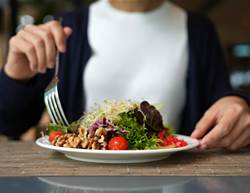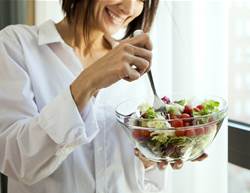There’s a ton of bad info about specific edibles causing—or curing—various ills. Don’t swallow these fallacies whole.
MYTH #1: Nightshades cause inflammation
MYTHBUSTER Exactly zero large-scale studies have found that nightshade vegetables—potatoes, tomatoes, eggplant, capsicum, and chilli pepper—cause inflammation.
The American Arthritis Foundation even encourages eating nightshades, because they’re anti-inflammatory based on their high lycopene and beta-carotene content, says dietitian Carmen Blakely.
But as with many other foods, some people might have a sensitivity to nightshades, Blakely says. If you don’t feel right after eating them—let’s say you have digestive issues, joint pain, or more inflammation—discuss it with your doctor.
If you decide to skip them, other great options with a similar nutrition profile include mushrooms, cauliflower and sweet potatoes, Blakely says.

MYTH #2: Eating soy gives men breasts
MYTHBUSTER Men can eat soy without worrying about bra shopping.
“Many studies have shown that there is no association between soy intake and hormone levels, cancer risk, or fertility in either men or women,” says dietitian Courtney Cary.
Studies that have made feminisation claims were done in rats at levels “far above any realistic amount for human consumption,” she adds.
The confusion is due to compounds in soy called isoflavones, a type of flavonoid that occurs naturally in plants, Cary says. These can mimic estrogen, but they’re not hormones, and they can even have anti-estrogen effects in the body.
The bottom line: At normal intake levels, a review of several studies found, soy didn’t impact men’s hormones or semen quality.

MYTH #3: Juice detoxing peels off the pounds
MYTHBUSTER No. Consuming only juice is a way of dramatically cutting kilojoules, and low-kilojoule diets can cause your body to hoard—instead of burn—energy, studies show.
You will see the number on the scale dip if you go on a juice fast, but it’s water-weight loss on borrowed time, says dietitian Anay Rodriguez.
The minute you go back to eating solid food, the weight will return. And while there are vitamins and minerals in juice, juicing removes a very important contributor to healthy eating and weight maintenance: fibre.
Fibre slows down your digestion and helps you feel fuller longer, whereas liquid meals leave you feeling a lot less satisfied.
“It’s important to remember that real food comes first and that the body needs certain nutrients on a daily basis to run properly,” says Rodriguez.
Stick to eating more whole fruits and veggies and high-fibre foods.

MYTH #4: Lemon water will speed up your metabolism
MYTHBUSTER “There is no single food or compound that can affect our metabolism,” says Cary. Metabolism is influenced by a complex mix of factors like age, gender, genetics, medications taken, exercise, and hormones.
So no, lemon water will not boost your metabolism. Lemons can, however, add flavour and a little vitamin C to your water. And if a squeeze of citrus helps you drink more H2O, that may indirectly assist with weight loss.
Water “helps you feel fuller throughout the day, which may help you eat less,” says dietitian Kimberly Melton. One study found that obese people who drank two cups of water before each meal lost twice as much weight as a group who were asked to imagine their stomachs being full before they ate.

MYTH #5: Coconut oil lowers cholesterol
MYTHBUSTER Coconut oil gets great PR, but it definitely shouldn’t be a go-to if you have high cholesterol or heart disease.
Coconut oil raises your “good” (HDL) cholesterol, but it raises “bad” cholesterol too, because it’s very high in saturated fat—in fact, it’s 91% saturated fat.
For comparison, bacon fat is around 50% saturated. Health Direct recommends that less than 10% of the total energy (kilojoules) you take in should come from saturated fat.
If your cholesterol is okay, there’s room for coconut oil—just keep your portion size to about two tablespoons a day, Melton says. Better choices include vegetable oils like olive oil, which are much lower in saturated fat and contain heart-healthy and cholesterol-friendly monounsaturated and polyunsaturated fat.










